#space feudalism
Text
I lean towards thinking that Paul was right to take leadership over the Fremen and then take power over the Empire, and Chani's wish for Fremen indepence but continuing isolation on Arrakis is misplaced.
Spice - because it allows safe interstellar travel - is too important to the Empire to let Arrakis go. If the Harkonnen's fail, other Houses will try and will continue to try. So if Arrakis cannot be left alone and independent, giving the Fremen a place in the power structure of the Empire is preferable to continued war and supression.
However, this might have also been achievable if Paul merely insisted with the other Great Houses that the Emperor abdicated and he is recognized as the Duke of Arrakis; the Houses could then have chosen a new compromise Emperor together. But we do not know if the other Houses would have accepted that or if they would have tried to conquer Arrakis for themselves - that would have resulted in the Holy War anyways.
(Also, the fact that House Harkonnen was tolerated by the Emperor while House Atreides was marked for destruction because they had a "weak heart" may mean that the galaxy lives under more misery than necessary and Fremen rule could change things for the better. Unfortunately we don't see enough of this world to really know.)
#dune#dune (movies)#dune part 2#house corrino#house atreides#fremen#space feudalism#colonialism and anticolonialism#rulership#the question of just war#paul atreides#chani kynes
17 notes
·
View notes
Text
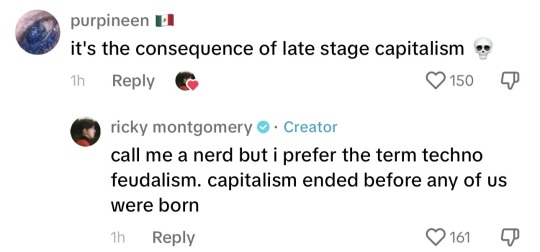
#(adding the song to help support ricky tooh#*too)#ricky montgomery#techno feudalism#i think this analysis is really good and we need to talk more about how creators are treated as content machines#space story#tiktok#artist mood#music
24 notes
·
View notes
Photo





TFT Little Legends: Burno - Galactic Victory - Feudal Future - Cooking Master - Space Groove - Mech Pilot
#teamfight tactics#tft#little legends#league of legends#burno#galactic victory burno#feudal future burno#cooking master burno#space groove burno#mech pilot burno#official
30 notes
·
View notes
Text
In ancient Rome, a brilliant inventor sacrificed his creation for the greater good, while a samurai in feudal Japan gave up his sword to save his village. In the future, a time traveler from the far reaches of space renounced immortality, choosing love over power. These heroes, bound by time and place, showed us what it means to be human.
#science fiction#poetry#characters#sacrifice#greater good#ancient Rome#samurai#feudal Japan#time traveler#space#love#power#humanity
2 notes
·
View notes
Text
*pats harrow* you can fit so much gender in this bad boy
#gideon the ninth#tlt#personal tag#she’s soooooooo fun to think about#is she masc?? femme???#butch?? feudal lord or mayhaps maiden??#non-binary or maybe a new space gender#maybe no gender!!!!!!!#there’s so much you can do w this#harrow is the potato of the locked tomb#versatile and beautiful in every form
20 notes
·
View notes
Note
May I know more about Queen Victoria and this angel eating incident?
*breaks through the wall* WONDERFUL QUESTION! Now, for this to make sense, we have to establish some ~worldbuilding~
The end of Earth begins in 1862, as prophesied by a certain Irishman. It begins with the arrival of an angel.
An angel arriving is not, on its own, a big deal - happens all the time, people don't notice and carry on. Angels are rarely concerned with humans, their creator usually sending them to check up on a species of fungi or microbes or whatnot.
This angel, however, ends up in the middle of a human war (particular war to be decided, 1862 was a busy year) and gets immediately shot to death because an average angel's survival mechanisms are zip and nada
An angel getting shot to death means that divinity - an angel's sort-of-blood, the matter they're made of - leaks out, and that is Bad Bad Very Not Good because uncontrollable miracles going haywire
Once a few brave mad scientists studied what happened at the disaster scene, they found out that very diluted divinity can be used to perform more controllable miracles, de-aging and possible immortality included
Of course every rich person wants in on that
Something something avarice something something fatal flaw they all OD on angel blood and get uncontrollable-miracled out of existence (it basically means that the laws of physics stop applying to you. Everything impossible is now not only possible, but will happen. Queen Victoria turned into seven thousand potatoes with "I'm sorry" carved on each one)
Also! Divinity powered wars :D polluting rivers and occasionally oceans with divinity :D having to flee the unstable planet :D (that's why in current times everything is in space)
#I love how this is very much post-apocalypse but also hopepunk#and we get tiny feudal asteroids and trains in space and blips/early model submarines in space#and the entire thing is sort of steampunk but also not :]#oleg's lore#thank you so much for the ask!
12 notes
·
View notes
Text
bro in this last andor ep where mon mothma or whoever is contemplating forcibly marrying off her 13 year old daughter whom she has a bad relationship with for rebellion money but hates that she was also forcibly married at a similar age and hates that she would even think about it but she knows she has to do it.... this show has stuff in it dude. Theres things going on in this
#even in the least actiony plotline. Hoo!#i cant pretend to be a star wars understander but that little flourish of feudal ideas on her planet is so interesting#w the like. kafka blade runner hard scifi thriller fascist intrigue of the rest of it#it feels like an icefire plot got shoved in there. i mean i guess u could draw on how fascism calls back to feudalism? im extrapolating#i dont know enough about the lore to say anything. just a very interesting subplot to throw in there#the space wizards of it all. or whatever (<- hasnt seen the prequels)#so much in subtext. Oooh girl.
11 notes
·
View notes
Text

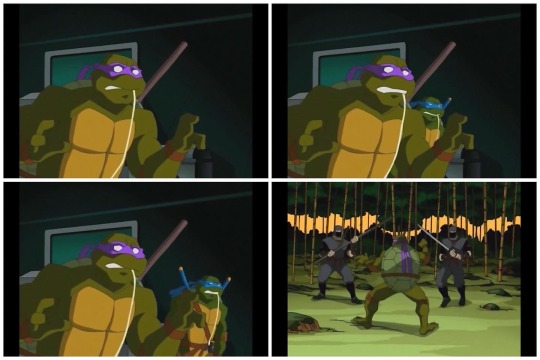





I can understand someone getting arrested if they heckled out to someone using words on the explicit list. But “Dirty Old Man”? Too simple and PG.
#layouts#screenshots#hobby#habit#teenage mutant ninja turtles 2003#tmnt 2003#tmnt 2k3#heart turtles#donny kun#dona chan#old crush#donatello#donatello 2003#turtles in space#secret origins part 2#feudal japan#simulation#bamboo forest#bamboo trees#bamboo sticks#feudal foot ninja#horrified#worried#shuriken#dodging#toppling#funny#cuddle turtle#raphael#leonardo
3 notes
·
View notes
Text
whoops, BTAU!Naomi is developing a bit of a Kira Nerys vibe
#I like it but I’m not sure where it’s coming from#could be because BattleTech is a much more cynical setting and it’s the only way to transplant her canon backstory’s energy#like The Expanse is pretty shiny and idealistic under the grime#both do have the same ‘unfortunately people will always be people’ thesis#one uses it to explore how we as a society would react to situations#the other uses it to justify bringing knights and tournaments and war as trial by combat back#…with huge stompy war robots#BattleTech is even more ‘space feudalism’ than Dune if that tells you anything#expanse battletech au
1 note
·
View note
Text
the urges to completely restart the dune series and read everything chronologically is hitting really hard right now
#ducksworth original#i mean what's stopping me#i'll reread 19 like 500-700 page books yeah sure#i need to read discworld or some shit#or mistborn like my friends have been saying for ages#my mind just craves more feudal space fantasy
0 notes
Text
Just wanted to say I have been internet-less for a while now, due to damage from a thunderstorm, and it's not clear when the problem will be fixed! Hopefully by Monday but that's also what they said last week. At first I was able to find some 3G here by sitting perilously on the very edge of that one specific window on the 1st floor of the barn >
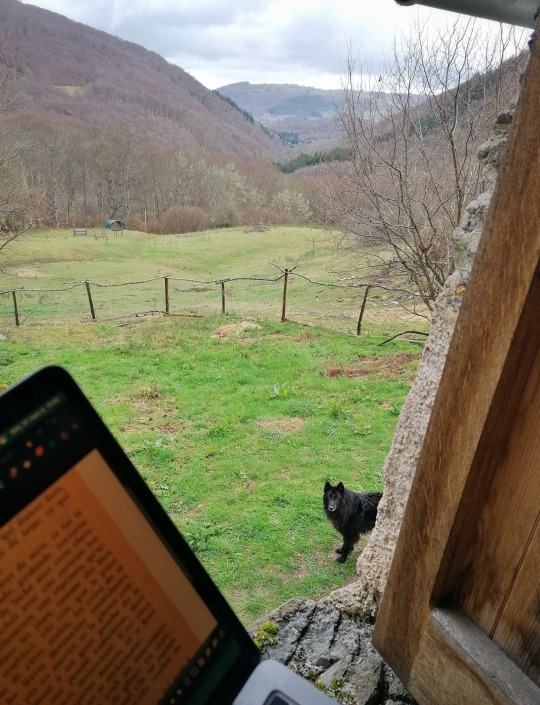
—but this no longer works for some reason. That's too bad because while I waited 5min for websites to load like it's 2001 I could watch the llamas bounce about and the chickens scour the pasture for insects, it was like having a real life Windows screensaver. But this week was very windy so I assume the elusive airborne internet in this corner of my barn has floated away elsewhere.
My next solution was climbing up to the plateau through the woods with my laptop under my arm to go sit in a pasture that's famous (to me and 1 neighbour) for having inexplicably good cell reception. It's funny because I sat nowhere near the road but Pandolf kept patrolling all over to check for enemies while I checked for emails so people driving by kept stopping their car and crossing the pasture to come say hi like, "I recognised your dog from afar!" I've had better luck keeping in touch with people I know via this great new social network called DogRun than via modern means of communication.

The guy who owns the pasture also came to say hi and when I told him what I was doing here, he looked at his phone and went like, wow, there /is/ great reception here, better than at my farm, I could come check my email here too. So this cow pasture is poised to become a trendy new coworking space.
But then I had to make a video call and that exceeded the capacities of even the great 3G Pasture, so I had to drive several km to sit under a tree a few hundred metres away from a village so I can leech their amazing urban 4G.

This is probably how a mediaeval peasant would make a Zoom call, once a week riding their donkey across the countryside to go sit in a field near the ramparts of the nearest fortified village and enjoy their feudal lord-sponsored high-speed connection.
#crawling along#just go to the library! you might say#i can no longer go to the library because i had to take a side in a Complex Rural Vendetta#until the dispute is resolved i have to get internet from cow pastures and that's just how it is
2K notes
·
View notes
Text
One aspect of the story of Dune that the movies don't make super clear is that, before Paul, the Fremen already had a central leader figure in Liet Kynes. In the book, Kynes has a generations-long plan to gather enough water to transform the environment of Dune (this is why the Fremen have those big pools, they never get super clear about that), then retake the planet for the Fremen and create paradise. Paul showing up and then leaning into the whole Lisan al-Gaib bit pretty much directly gets Kynes killed, creating a power vacuum into which he assumes himself with the aid of his previously-unheard-of levels of white privilege. While Kynes was an ecologist, however, Paul comes from a family of colonial military aristocrats. All Paul can offer the Fremen is all he understands: revenge. Bloody revenge for everything they've endured in centuries of oppression by the Imperium, temporarily in line with the revenge he craves for the Imperium's attempts to control him and his family, and spiritually in line with the resentment built up all across this socially stagnant feudal space empire.
2K notes
·
View notes
Text
Masterpost of TLT metas
This is mostly for my own reference, as tagging doesn't seem to guarantee something being findable on Tumblr...but if you like wildly overthinking lesbian necromancers in space, enjoy!
Overthinking the Fifth House:
What is a "Speaker to the Dead"?
Actually, Magnus Quinn isn't terrible at sword fighting
Imperial complicity: Abigail the First
Pyschopomp: Abigail Pent and Hecate
Did Teacher conspire with Cytherea to kill the Fifth?
What does the Fifth House actually do?
The Fourth and the Fifth can never just be family
Cytherea's political observations at the anniversary dinner
Abigail Pent's affect: ghosts and autism
Were the Fourth wards of the Fifth?
Abigail probably knew most of the scions as children
Magnus Quinn's very understandable anger
Fifth House necromancy is not neat and tidy
Are Abigail and Magnus an exception to the exploitative nature of cavaliership?
"Abigail Pent literally brought her husband and look where that got her" (the Fifth in TUG)
The Fifth's relationship dynamic
The Fifth's relationship is unconventional in a number of ways
The queer-coding of Abigail and Magnus' relationship
Abigail and Palamedes, and knowing in the River
Was Isaac the ward of the Fifth?
Did Magnus manage to draw his sword before Cytherea killed him? (and why he probably had to watch his wife die)
How did Abigail know she was murdered by a Lyctor?
Fifth House necromancy is straight out of the Odyssey
The politics of the anniversary dinner
Was Magnus born outside of the Dominicus system?
Overthinking John Gaius:
The one time John was happy was playing Jesus
Is Alecto's body made from John's?
Are there atheists in the Nine Houses?
Why isn't John's daughter a necromancer?
The horrors of love go both ways: why John could have asked Alecto 'what have you done to me?'
Why M- may have really hoped John was on drugs
What is it with guys called Jo(h)n and getting disintegrated? (John and Dr Manhattan)
John's conference call with his CIA handlers
Watching your friend turn into an eldritch horror
Why does G1deon look so weird? (Jod regrew him from an arm)
When is a friendship bracelet not a friendship bracelet?
Why did John have G1deon hunt Harrow? (with bonus update)
The 'indelible' sin of Lyctorhood and John's shoddy plagiarism of Catholicism
Are John Gaius and Abigail Pent so different?
What was Jod's plan at Canaan House?
John and Ianthe tread the Eightfold path
The Mithraeum is more than a joke about cows
When was John Gaius born? (And another)
John Gaius and the tragic Orestes
John and Jesus writing sins in the sand
John and Nona's echoing chapters
John's motivations
Overthinking the Nine Houses:
'No retainers, no attendants, no domestics'
Funerary customs and the violence of John's silence
Juno Zeta and the terrible, horrible, no good, very bad time
The horror of the River bubble
Every instance of 'is this how it happens' in HTN
Feudalism is still shitty even if you make it queer and sex positive
How do stele work?
Thought crime in the Nine Houses
The Houses have a population the size of Canada
What must it be like to fight the Houses?
You know what can't have been fun? Merv wing's megatruck on Varun day...
Augustine's very Catholic hobby (decorating skeletons)
Necromancers are not thin in a conventionally attractive way
Matching the Houses with the planets of the solar system
Why don't the Nine Houses have (consistent) vaccination or varifocals?
How would the Houses react to the deaths at Canaan House?
How does Wake understand her own name (languages over 10,000 years)
What pre-resurrection texts are known in the Houses?
Camilla and Palamedes very Platonic relationship
The horrors the Cohort found at Canaan House
Do the Houses understand the tech keeping them alive?
Overthinking House religion:
What do the Houses believe about death?
Was M's nun a Franciscan?
Cavaliership and arbitrary socio-religious structures
Ritual scarification
Sacraments and sacramentals
What did Silas think god wanted at Canaan House?
In defense of Silas
There's no such thing as a 'good' necro/cav relationship
Veiling and shaving in Ninth House cult practice
Tongue-in-cheek thoughts on Eighth and Sixth religion
A very long deep-dive on House belief and practice
Overthinking Harrowhark Nonagesimus:
'The meat of your meat...belonged to god' and 'that is how meat loves meat'
The horror of parental touch: Harrow, John Gaius, and Abigail Pent
Why is Harrow so obsessed with Abigail's hands?
Frontline Titties of the Fifth and transgressive necro/cav relationships
Harrow, Wake, and permeability of the soul in HTN
Bible studies for weird queer necromancers:
Epiphany: revealing god's child to the wider world
The Holy Innocents and the creche massacre
The Virgin Mary and Commander Wake
John Gaius and John the Baptist
Instantiating the Trinity and the Second Resurrection
What's the significance of Paul?
St Paul's theology of gender and sexuality and the House theology of cavaliership
Maundy Thursday: consuming another for eternal life
Harrow and the Harrowing of Hell
#the locked tomb#tlt meta#I like thinking about TLT a normal amount#Please do reply or reblog with your ideas or send asks!
3K notes
·
View notes
Text
i love lancer the mech rpg. the imperial core had a revolution because they felt bad about doing imperialism and now is a post-scarcity fully automated luxury post-capitalist utopia. the periphery though is still ruled by megacorps and feudal lords both official recognized as states and practicing slavery and eugenics but like, the core feels very bad about it I'm told and the space UN occasionally sends over a couple blue helmets (you the player). oh yeah and the megacorps and feudal lords have like a third of the seats in the space UN and are load bearing pillars of the interstellar economy.
anyway this is a Utopia In The Making, it's not perfect yet otherwise there wouldn't be a game but we're working on it. the Good Guys are in charge. hopepunk or whatever 👍 if you call it dystopian I'm banning you from my discord server
663 notes
·
View notes
Text
a fine selection of bonker facades from the DC suburbs
Howdy folks! In honor of Halloween, here are some of the scariest houses currently for sale in the ever-cursed suburbs of Washington, DC. It's been awhile since I checked in on this particular hotspot, and once more, it did not disappoint.

I'll just get this one out of the way. Long-time McMansion Hell-heads are well aware of this monster estate in Potomac, MD, once allegedly owned by a particular professional athlete who will not be named, because the house should suck on its own merit. The only nice thing I can say about this house is that the designers kept the materials and colors consistent, which adds some unity to what is, in reality, five turrets in a trench coat.
Some things, the economists tell us, are too big to fail. This is not one of them. Let's move on.

Many McMansions exist to mock the concept of architectural consistency and historical continuity. This is one of them. About every single type of expanded second-story window elaboration exists here: bay window, covered balcony, juliet balcony. None of them work. The house can't decide if its 19th century eclecticism or tony DC Georgian/Federal cocktail. The random cupola merely adds insult to injury.
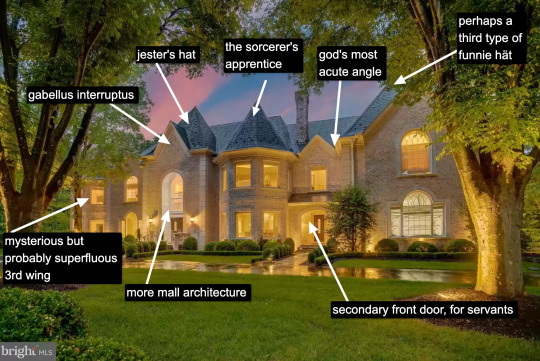
I don't know where realtors learned how to do photoshop, but whoever taught them should have their Adobe licenses revoked. There's a certain type of McMansion I call a "hat house" - which is exactly what it sounds like. It's a house with multiple bays or masses and each has its own special hat. This is one of the most egregious examples because all of the hats are different shapes and scales. Not even the most Disney Theme Park pink sky and fairy lighting can mitigate the controlling aesthetic influence of hät.

No compilation of Bad Facades would be complete without at least one Frankentudor™. Rich people in America really like to harken back to the days of feudalism, yet uglier, more drab, and using materials mostly derived from petrochemicals. The lighting is not helping this house, which is about as gloomy, hulking, and bloated as they come.

I have some fondness for houses that derive new, inventive forms of being ugly. The spread eagle McMansion is one of them, two oblique wings with no real core. A corner lot specimen. This one is especially weird, with the quadruple portholes, the windowless bays, the mall foyer, and the hipped roof that's not quite clipped, complete with tacked on gables. Kind of neat, sad to say.

I know most of you won't agree, but I actually believe this is the worst McMansion of the set. The absolute banality of it, the out-of-proportion everything, the compound-like demeanor, the nonsensical spacing of the mind-numbingly identical windows. The most infuriating part is that whoever designed this had some kind of order, continuity, proportion in mind and just failed utterly at it, like Sideshow Bob stepping on all those rakes. I hate it!!!!
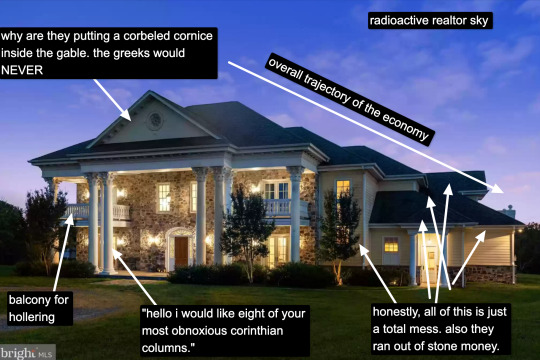
When rich people try to make overly-inflated temples to their dumb piles of money, it's deeply satisfying when they end up looking like this house, which is just a pile of roof and wall tacked on to the worst proportioned portico imaginable. Classic McMansion Hubris. Let us all laugh.

Now we're getting into the more eldritch horror part of the list. Some houses make me wonder if I have the same set of eyeballs and conceptions of what "a house" looks like as other people. This one is playing dress up games with foam stickers. It looks like Steve's shirt from Blues Clues. It abuses the prairie muntins, which is an insult to my chosen hometown of Chicago, Illinois. Bad house.

Not enough time is devoted on this blog to bad modernism, though it would be rather generous to call this house modern. It's more like postmodernism trying to remember what modernism looked like and tripping down a flight of stairs collecting random masses and windows on the way down. Houses like this give modern architecture a bad name. It's borderline libel. Also it looks like it was made out of cardboard.
This brings us to our final, and objectively worst house:

I don't even know what to say about this freak of architecture. I don't know how it came together or why. I don't know what it wants or even pretends to do. It is a horrorshow. Gables protruding from random places, stealth roof fragments, windows too small for the walls they're embedded in, a weird cathedral-like entrance, the mosquito-infested pond, the worst example of realtor sky I've ever seen, all of it is terrible. It's haunted. Trick or Treat, but without the treat.
Anyway, that does it for this installment. If you're curious about more McModern badness, this month's Patreon bonus post will be to your liking!
Happy Halloween and Día de Los Muertos!
If you like this post and want more like it, support McMansion Hell on Patreon for as little as $1/month for access to great bonus content including extra posts and livestreams.
Not into recurring payments? Try the tip jar, because media work is especially recession-vulnerable.
#architecture#design#mcmansion#mcmansion hell#bad architecture#ugly houses#dc suburbs#90s architecture#2000s architecture#y2k#urbanism#virginia#maryland
4K notes
·
View notes
Text
Worldbuilding: Galactic Empires

My only complaint about the Prequels is that they needed MORE politics
If you've watched Dune recently, you must have noticed the whole Emperor and space noble families thing. And yes, it's likely you heard that in WH40k too… and I HOPE you know that's where the God Emperor came from, since WH40k took "inspiration" from everywhere from Dune to Star Wars. Which also has a Galactic Empire. Like so many other science fiction franchises.
In fact, if you're a science fiction fan, it's very likely that you're familiar with space or galactic empires, they seem to be common as dragons in fantasy. Despite the fact that an empire doesn't sound very futuristic, does it?
Where did all these Galactic Empires come from? Are they just a narrative tool or are they an actual possibility? How would states and societies work in space? Let's find out, and maybe I can give you some ideas on how to write fun galactic "empires" from both a narrative and plausibility perspective.
This is going be a long post. Perhaps my longest yet. But I hope you have as much fun reading it as I did writing it. Click down to continue.
First of all, where did these space emperors come from? In another post, I've talked about the influence of the idea of the rise and fall of the Roman Empire in English-language fiction. However, in science fiction, I would say the influence is more direct. The Foundation trilogy of Isaac Asimov, one of the foundational (lol) works of science fiction, was intended by the author, very explicitly, as a retelling of The History of the Decline and Fall of the Roman Empire by Edward Gibbon in a science fiction setting. He probably wasn't the first to think about a space empire, I'm very sure the term is older, but he certainly popularized it as a staple of science fiction. Now, if your contact with science fiction comes from movies, when you hear Galactic Empire you're of course thinking about Star Wars. But yes, Star Wars is also the same retelling, because Lucas was inspired in both Asimov AND Gibbon, even though I think we should appreciate Lucas' ability to bring it to life in the screen. Certainly, Isaac Asimov wasn't the first or the last to take inspiration in history to tell stories about the future.

The most influential science fiction work of all time.
At this point you're probably telling me (or not, I don't know you) about all other sorts of science fiction works that DON'T have galactic empires, or better yet, those that don't just transpose historical societies into the far future and imagine something entirely new (my personal recommendations on this area are Banks and LeGuin). And you'd be right. But the concept of a space empire seems popular and long-lived, much like feudalism in the fantasy genre, everyone has a picture of a sorts when a videogame or a book talks about a "galactic empire" or "galactic republic" or a "federation", an "empire" much like a shorthand name for "a country In Space", regardless of the presence of an actual Emperor or not. And so, it's worth exploring how this trope could, or not, work, so we can see the possible alternatives or more fun ways to approach it.
Besides, that's the title of the post. Galactic Empires.
So, let's approach this from the perspectives of Space, Time (or to keep with the theme, Spacetime) and Technology, and lastly, the most fun part, we'll explore some fun variations on this idea of galactic empires and societies.
Space:
Space is big, and I won't quote the Hitchiker's Guide to the Galaxy here, it would be groanworthy at this point. Let's do a quick exercise instead. Let's image a "modest" space empire, not even galactic, 2000 light-years across. Sounds quite big, it encompasses most of the visible stars we can see from Earth… however, if you project it into a galactic map, it's actually a very small piece of sky, actually 2% of the entire galaxy which is about 100.000 ly across. Now, according to the Atlas of the Universe, there are 600 million stars in a 5000 ly radius from the Sun. Jesus Christ. This is actually hard to estimate accurately as the true number of red dwarfs and brown dwarfs, the dimmest stars, are hard to count, but we already know those have planetary systems as complex as our own Solar System, even planets that could bear life. Let's scale back to our 2000 ly across space empire, again, just a small cozy corner of the Milky Way Galaxy, something that would look like a small, even tiny, nation in any setting of a galactic scale. This gives us 240 million stars (from the estimated 200 billion stars of the galaxy) in this space, which is still completely insane but let's work with that.
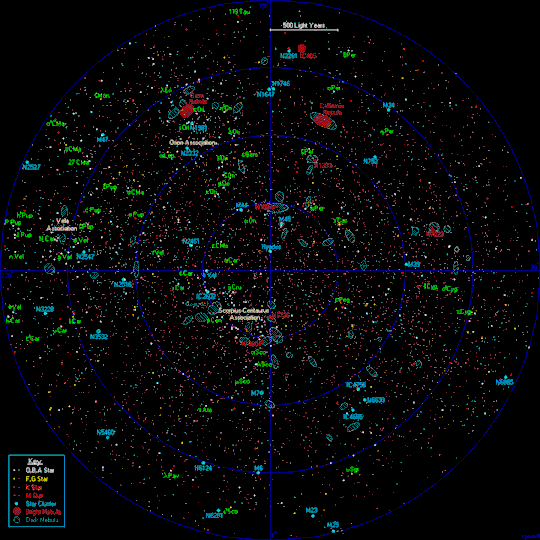
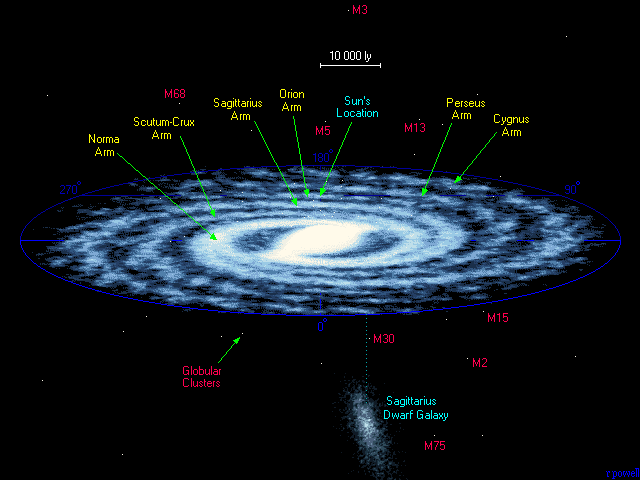
From Atlas of the Universe, so you can compare and contrast, the stars 2000 ly from the sun (ONLY the brightest ones), and the entire Milky Way. Notice how small 2000 light years truly are at that scale.
Even if I just told you that all of those systems might be as complex and rich as the Solar System, let's rather arbitrarily say only 5% of those 240 million are worth of note. Not necessarily having life (no way I'm getting into that yet), just worth visiting or living in for the resources or the views or the cantinas… whatever. That's 12 million star systems. Okay, let's refine this further. Let's say of those 12 million, most of them are the equivalent of gas stations or farmsteads, a couple thousand people at most. The REAL places where the action happens are the systems or worlds where millions of people live, and those are few and far between (this makes both common and narrative sense, as people tend to cluster in population centers where trade, resources, etc. are). Let's say, and let's refine this further so I don't get outrageous numbers, the average population of those systems is 100 million (about the size of Mexico, Vietnam or Japan. Many sci-fi works throw worlds of billions like Earth like nothing). And those systems are… uh, like 2% of THOSE 5% 'systems of note' (a flimsly concept already but play along). That's 2% of 12 million. We got 240.000 systems or worlds the population size of entire countries, with all that implies (economy, culture, politics). Of course, 240.000 multiplied 100 million gives this speculative fictional empire a total population of… (Jesus Christ, not the scientific notations), 2.4e+13, or TWENTY FOUR TRILLION PEOPLE.
Let's wind back and remember I tried my best to make a "small" empire for a galactic-sized setting, 2000 light-years across, that's just from here to Orion's Nebula for Gagarin's sake! A trillion people is just outside the realm of my imagination, or pretty much anyone's. Can you imagine any kind of goverment system that would be enough to provide any kind of meaningful governance to 24 trillion people? In the case of a space empire, can you imagine a single space emperor, a single person, deciding over them? Keep in mind that emperors don't rule on their own (we'll talk about that), they need bureacrats to make their will done, and vassals to govern their territories in their stead. This would apply even in democratic systems, you need representatives and civil servants and more.
Let's scale back a bit before I go insane. Instead of assuming territory, let's go with population. Assume a spherical cow space empire of… 40 billion people, that's reasonable right? You can picture that in your head? Five times the population of current Earth, no biggie, we can work with that, it's all cool. Now, how big would a goverment for such a population would have to be? We actually have reasonable answers. China has about 10 million civil servants for a population of 1.4 billion people, but that's only the administrators, not including all the teachers, healthcare workers, security forces, laborers, etc. employed by the state. India has 6.4 million for about the same population. Okay, so easy math, let's say that this space empire has 6 million bureacrats for 1 billion people, for our empire of 40 billion people, that gives us a total of 240 million… just bureacrats, nothing else. Yes, you could reduce that with technology by say, half. It still means an entire Mexico-sized country of bureacrats. Imagine.

Entire worlds of this.
NOW I WILL STOP THROWING NUMBERS AT YOU, and let's just think about what this means. If we assume a space empire like the ones common in science fiction, or just any kind of… goverment at all, we're talking about, at the lowest estimates, entire countries worth of state employees, if not whole EARTHS of bureacrats. You can guess how things can get really weird fast. Current goverments as we know them just won't work at all it even if technology gets more powerful. Leaving aside, for now, things like god-like AI adminstration (yeah, have you seen what they are like now?)… to exhert ANY kind of control, FTL or not (more on that below) you would need a very, very autonomous empire, to the point it might as well not exist at all. Why take orders from A Guy who is not only far away but also has no hope at all of actually enforcing them in any meaningful sense? Why call yourself part of his "empire" that not only cannot enforce anything upon you, but also cannot benefit you in any way? Big question, of course, the benefit of a galactic or even smaller empire, but we'll discuss that later.
What could work, however, is that instead of a centralized state like we concieve it today, or even a loose confederation, even loose alliances, even pretty much anything… 'empires' (as in 'countries') In Space could be "united" by common ideas and culture instead of any institution. Perhaps not even a written delcration or constitution, but shared ideas: a culture, a religion, an ideology. Lots of different strong mini-states (that might mean billions of people…) that all claim to be part of the same "civilization", but share no goverment at all at all, just the same 'idea', in a looser way that even the most decentralized goverments you can think of. You can say "well all countries are made up" but these would barely qualify as even that. Not even the Holy Roman Empire was this fake.
Perhaps even a single person as a symbolic focus point of unity? Which would be actually a score for the proponents of galactic empires in the most literal sense. But at the same time, such an Emperor would be completely powerless to interact with the entire galaxy. His plans for, I don't fucking know, education reform or tax breaks, would have to be filtered by literal millions of bureaucrats and vassals that at that point might do whatever the hell on his name. Military-wise, his armies would count as nations of their own. However, the overall guidance of a single person (or constitution…) as a symbol might make otherwise disparate worlds to collaborate on the same causes, being part of the same greater whole no matter the distance. So maybe, instead of a Galactic Emperor, a Space Pope?

OH MY GOD-EMPEROR WAS THE IMPERIUM REALISTIC ALL ALONG? Probably not, but also yes, let's keep talking.
By the way, I'm sure you're tired of big numbers now, but I did one possible calculation for the whole galaxy, a true Galactic Empire. Asuming just 0.2% (400 million) of the 200 billion stars are populated, with an average population of one million, the size of the smallest countries that aren't micronations. The total galactic population would be 40 trillion, or 40,000,000,000,000. Five thousand Earth populations.
Time:
Or rather, space-time. We'll talk about both, because what concern us is the speed of information and trade, and that also limits the size of our empires.
I'm sure you know by now faster-than-light travel is impossible. Most of space based science fiction has it, of course, for narrative purposes. We don't want Our Heroes to spend two thousand years to get to the lair of the Evil Space Tyrant, I don't either, and I'll discuss FTL soon. But let's start with no-FTL here, just like in real life, and a smaller "empire", much, much smaller than my previous examples. A mere 250 light years across. Let's not even calculate population now.
This, quite logically, means that the fastest your communications would flow is at light speed. So if your emperor issues orders to a nearby world, say, 5 ly away, you will get an answer 5 years later. For a more reasonable distance of 60 ly, you would know the results 60 years from the descendants of those who recieved the order (now, assume however they keep in constant conversation, just with a 60 year delay), and by then, things there would have changed 60 years from the capital. You get the idea, Einstein sucks, don't need to elaborate more. At first glance, this might be another point for old-style feudal star empires, though. What better way to guarantee your empire is working well over centuries than by having an hereditary class of nobles loyal to you, no matter how much time passes (results may vary). Of course, how would you even enforce that? Rebels might overthrow them and you'll learn about it a century later, and you'll have to send ships to quash the rebellion… or would you?
Is there a point to send ships to conquer other worlds in such a situation? What kind of resources (ah, the lifeblood of empires) could you control with such an empire where transport takes decades and industry is so developed you could, theoretically, make manufactured goods yourself? I'm assuming you can, because you can build spaceships to get there in the first place (not unreasonable), but what would justify creating an interstellar goverment controlling people, trade, resources, over light-decades? Normally, it's at this point where sci-fi authors make up Something (what Atomic Rockets calls "McGuffinite") to justify interstellar trade. In Dune, for example, it's Spice, which is kind of like, to steal a joke, petroleum mixed with cocaine. But otherwise, in a no-FTL setting (so, real life as far as we know) there isn't really the incentive to conquer or even form a goverment of any but the looser kind with other worlds. Trade, maybe, but those are long-term investments, it's difficult to think what kind of good or service would be so in demand would justify it. Especially when you consider that light-speed is your upper limit, and ships might be actually way slower than that. And I'm not even gonna begin to touch relativistic effects.

I was going to make a joke about blowing a quarter of your GDP in Star Destroyers, but have you heard of the South American Dreadnought Race? One of our dumbest moments down here, surely.
Add FTL, and things change, of course. Even very slow ships, that would take months to transverse a dozen light years, would be able to justify trade in luxury goods and passengers, for instance. This is not too far from real-life either, after all, European colonial empires had travel times in the months, and they had to install local administrations such as viceroys because of this, yet rhose places they were considered part of the same empire (most European empires could be rather considered a collection of "countries" and colonies, look at all the divisions of the Spanish Empire for instance). Faster and cheaper ships would of course, mean even more trade (here, I'm using 'trade' as 'communication between worlds', not necessarily implying capitalism, it could be mercantilism or even a command economy) between worlds, even perhaps the classic trope of agrarian and mining worlds feeding the rich core worlds. The Open Veins of Latin America In Space. Fun.
The speed of your ships and communications not only determines trade, but the power projection of your state (we can discuss 'stateless' societies too, there's plenty of fun to be had). If, again, your Galactic Emperor makes a Galactic Proclamation from the Galactic Palace near the Galactic Core (let's roll with that) and he has no FTL communications of any kind, it means that his commanding voice would reach the outer edges of the galaxy 100.000 years after, that is, almost ten times the history of agriculture on Earth. If he, however, has access to ships that can cross the galaxy in say, months, yes, perhaps he can have a series of vassals all over the stars (perhaps, we'll see…), and the faster things are, the closer they resemble our current fast-paced society, but not quite, given the available resources and space in… SPACE and the possible population, as we discussed above. As you can see, the speed of your FTL or lack of it determines everything.
There is another, more *realistic* option. Instead of individual FTL ships, you could have wormhole portals connecting worlds. This is more realistic in the sense that it's theoretically possible (though we have no idea on how to make one), but it also has some interesting implications. First of all, there is an implication that such a wormhole network would be expensive to build and maintain, requiring highly complex technology, material (I'm not sure what the hell exotic matter really is) and production methods, well, more high than what you'd expect from the usual. Second, it would be something preferably fixed, with hubs, planned routes and regular transit (and for writers, it easily allows you to map your universe). Such networks would be vital pieces of infrastructure, built and maintained by central authorities, drawing routes and transport hubs in space. Yes, indeed, almost like… space railroads.

OH MY ASTRAL EXPRESS WAS HONKAI STAR RAIL REALISTIC ALL ALONG? (last joke I promise)
There is also a very strange effect about wormhole networks. Time is relative, as you know, and this is not a metaphor, it literally "flows" differently on how fast you're moving. The "universal" "speed" of "time" "seems" to be the speed at which matter moves in an expanding universe (red-shift and blue shift) as I understand it, but as you approach light-speed, time flows differently in your frame of reference. Wormholes are strange in the sense that they connect space AND time, the observable time in both sides of a wormhole would be the same, and as such, places connected by a wormhole network will "be" at the same "time". This has been talked about by some authors who have considered about wormholes in the context of space civilizations, and it's called (STOP!) Empire Time. So a space empire might not only imply a state ruling over a population and a territory, but also over a time. I have no idea how this works and it frankly makes my head hurt, but here is an analysis of transversable wormholes if you want to indulge or hit your head against a wall.
Technology:
As an extension from the previous section: Of course there is no working FTL method known in real life, as far as we know, light-speed is the upper limit for everything. Instead of constraining you as a writer, this can be one of your biggest assets.
Because if you're doing a space setting, the existence of faster-than-light travel and its speed is the most important decision you can take about it.
Got that? Did I emphasize that enough? You don't need to actually explain HOW your FTL system works, you can do some research and invent something, but you need to be clear, in your head, what it can DO: How far and how fast it can take you. A FTL system that takes months to go from star to star will be very different to one that takes hours to span the Galaxy like the hyperdrive of the Millenium Falcon. A FTL system that is cheap and can be installed in any tiny ship like in the Elite videogame would be different from the ones in Dune where interstellar travel requires enormous motherships and lots of drugs, or a wormhole network that needs massive infrastructure maintainment and probably a railway starway worker's union, or the case of no FTL at all. This is, again, the most important decision you could make for your setting, bar none. Got that? Let's continue.

FTL is perhaps the only place in science fiction where I don't care about how it works, only about how fast it goes
Now, technology. Space empires, are of course, not possible without space travel being cheap enough (not talking about FTL, just regular space travel): shipping stuff to space should be about the same as shipping stuff by airliner or, well, ships. This is not unreasonable. Efforts are being made right now to lower the cost to access space, and while space agencies like NASA might look expensive, they are not NEARLY as expensive as the money wasted in say, stealth jet fighters or fucking advertising (people who say 'why spend so much money in space when we could fix our problems on Earth' seem to forget about that all the time. But I digress.). A technologically advanced, wealthy (as in production, not literal dollars) society could easily afford as much space exploration as they wish with no real effect at all in their quality of life, indeed, it would improve it. Space isn't as expensive as it seems. At its very, very core, a spaceship is just steel and propellant.
And steel and propellant are very, very easy (once you got the technical research to do it) to get in space. Asteroids are MADE of iron and metals, a single asteroid is richer than all of Earth's mines combined. Hydrogen is literally the most abundant element in the universe, and water is on plentiful supply (no need to steal planets for water) on comets and icy asteroids and moons. Carbon is apparently widely available in carbonaceous asteroids, and in our own Solar System, Titan, the moon of Saturn, is basically covered in hydrocarbons (yes, OIL IN SPACE). All those resources could be very much in demand for manufacturing on a planet like for example, a future Earth that has taken its industry up to space. What's more, it's only bringing stuff up from Earth/an Earth-like or more massive planet (fun sci-fi term for you: "down the gravity well") that's really expensive. Once you get there, you can get anywhere with enough acceleration and propellant. Once there is space infrastructure and industry (and I get a feeling that it might get up fast, given that space technology would need to be very autonomous and reliable), it can sustain itself without a mother planet. In fact, if there's something I imagine would be considered a luxury in spacer life, it would be truly organic things; plants, wood, meat, wool, and so much more.

i am average astronaut man i work 15 hours in the asteroid mines to buy one burger
Which brings us to the big question; what kind of life would be out there? After all, I gave you numbers of millions and millions of worlds, it's hard to imagine at least a few of those don't have alien life. This is the biggest outstanding question in astrobiology currently and so I won't pretend to even try to answer it (my personal opinion, if you must, is that complex Earth life is extremely rare, but by sheer number of planets, it might exist by hundreds of thousands in our galaxy alone). Instead, let's try to see how science fiction looks at it.
Heinlein, another of the foundational writers of science fiction as a genre, saw alien worlds as just another frontier to be settled. Rich alien fruit, fertile arable lands, and huntable or tameable creatures just waiting to be exploited, and alien species to trade exotic goods with (or conquer). While Heinlein was not the only and probably not the first to write this subgenre, he certainly got it popular, and lots of works on his same vein follow this "frontier spirit" kind of writing, where space is seen as the last frontier to be tamed by hardy colonists in a very yeehaw cowboy western setting, and you can actually see this replicated in many modern science fiction like Firefly and the more cowboy-ish parts of Star Wars. And yes, this is balantly an expression of the 'manifest destiny' Usamerican imperialist worldview.

lots of Politics all over this Science Fiction Adventure
And yes, this idea of 'habitable' planets ready to be colonized like in a 4X videogame is also not very realistic either. We haven't found any alien ecosystems yet, but as a biologist I can tell you they would be very different from us in ways you probably won't expect. We can discuss how convergent evolution could be, a world with oceans would probably have equivalents of 'fish', 'algae' and 'worms' (I can GUARANTEE there will be A LOT of worms), we could even find very, very similar life to our own down to the body plan. However, we most probably could not eat them at all (which might sound silly at first glance but is needed to have you know. agriculture.), or perhaps even live in the same planet as them. We live in a society planet where most of the plants and animals which evolved with us can't be eaten, and many of them are toxic. It's possible, entirely likely, that the alien equivalents of carbohydrates (ever heard of L- and D-Glucose?), proteins and other substances would be indigestible to us, allergenics, or outright toxic, probably in ways we can't even think off. It's likely we won't catch alien diseases, but that's because our cells (if they even have cells) are completely incompatible with their diseases, just look at how different animal, plant and fungi cells are, now imagine whatever the fuck might evolve in a completely different biochemistry from us. There would be no farmsteads and cowboys like Heinlein wrote, living in Mars would probably be more pleasant that living in a world where everything might be toxic, not because life evolved to be toxic, just because it didn't evolve with you. If anything, these' habitable' worlds would be treated like giant nature preserves instead, you can look but don't touch.
(In one of my own settings, I sidestep this by proposing panspermia, that is, the idea that life spreads across the universe by means such as comets (or aliens) and thus shares similaritites and can eat the same stuff. A bit of a cop-out, but it does allow one to get with similar kinds of life.)

NOOO ANAKIN DON'T EAT THAT PEAR IT EVOLVED HIGHLY TOXIC ALKALOIDS IN A DIFFERENT EVOLUTIONARY CONTEXT NOOOO
But humans, if the biophilia hypothesis is right, will need nature in their lives. This is where orbital habitats come in. You know, like the ones in Gundam? Orbitals such as O'Neill Cylinders, Standford Torii (yeah, that's the plural for Torus) as well as bigger and more complex thingmajings I will write their own post about someday, have been proposed since the 1970s with technology available then, and there is no reason why a civilization with an advanced space infrastructure wouldn't try building them and even be better at it. What's very nifty about orbitals is that you can really make them your own personal custom miniworlds. Designs like the O'Neill cylinder are big, able to house hundreds of thousands, even millions of people if build to the top, but why do that? Mess with the lightining, the rotation, or the interior to make them a winter wonderland or a tropical paradise. I expect that they would be built to feed space communities at first with food that isn't imported from Earth or grown in hydroponics, and later as places to live and customize however you wish; perhaps a community would pool resources together and say, hey, we want to make an habitat that looks like a Colombian cloud forest, or the Okinawan Islands. Once they get cheap enough, and given how abundant resources are in space they might be not even as expensive as most engineering projects here on Earth, I expect actually many, many people would want to live in them, and it could be probably be very affordable, and just natural for the people who are born and raised and live and die in them. Another thing about habitats is that they are mobile. Like I said, as long as you got enough propellant and propulsion, you can move anything anywhere in space. Even whole habitats could move and cluster together depending on the local politics. Perhaps, much like city-states were the basic building block for countries in antiquity, in the future, the basic organization bloc would be the Orbital. You could have alliances of orbitals forming complex political intrigue inside a single solar system (yes, like in Gundam).

OH MY PLASTIC MODELS WAS GUNDAM REALISTIC ALL ALONG? (I lied)
This all might make space empires pretty much an unnecessary anachronism. Habitats can grow their own food and resources are plentiful once you have the right technology. They can also be mobile, so they could act like migrating cities at will, choosing to stay with like-minded "constellations" or strike out on their own without the dictates of a central state. It almost looks like an ideal anarchist society.
Or does it?
There is something very important to keep in mind about life in space. The technology, that is, habitats needed for life in space will require lots of maintainance and resource management, which implies there must be strong coordinating bodies with very, very strict rules so that shit doesn't blow up and you lose all your air into space, or the resources of an habitat are mismanaged and you end up with a food or water or even oxygen crisis. There is a reason why space exploration is done by state agencies or corporations with huge state backing. Another of Heinleins's favorite tropes, Libertarians in Space, would be impossible in such a situation. Actually, in ANY space situation, and this is why this section is in technology. Living in space requires you to be able to maintain complex technology and manage resources. None of this can be done ad-hoc or be left to individualism, you have to have Rules and follow them to the letter. And also, the effect of living in your 'own little world' would probably mean people have a strong indentity sense towards their home habitat. This will mean a more communitarian attitude. But before you think I'm waxing poetic about utopian habitat cultures, keep in mind that this also can mean an authoritarian mindset. After all, cults and authoritarian regimes do have "strong communities" too. An habitat could be everything from a well-managed place with responsible citizens who look for the welfare of all, to a closed society where everybody does as they're told as long as the tech works. On the other hand, I doubt habitats in a single star system would stay isolated. They'll probably trade and communicate with other habitats, forming constellations and power groups, that would prevent this 'closed system'. However, I doubt they would be too amenable to interstellar authority. Who the hell do those people from another freaking star think they are to tell us what to do in our habitat?

To be serious for a moment, habitats can be really cool places in science fiction. Especially if you imagine they could host all sorts of enviroments, from the tropical to the polar.
As an addenum… what if you really want to live in a planet? In places such as Mars or the Moon, things would be… pretty similar to orbitals actually. Habitats separated by vast expanses of barren nothingness, only now a planet instead of space (better for maps, at least). But that isn't what you're thinking, right? What if you wanted to feel the open wind and sky instead of a canned world? Well, this is where terraforming comes in. Transforming whole planets is something theoretically possible, but that would require massive investments of resources, more massive than anything we can imagine, and time, centuries at the very, very least. So stupid ideas like "terraform Mars to escape Earth", which as far as I know is only held by dumbasses like Musk, just don't make sense. It doesn't mean that terraforming itself is a worthless idea, it is a very appealing one. No matter how cool you can make your habitat, it won't ever be Earth. It won't ever be a self-sustaining biosphere with its own ecosystem that could last millions of years. For that reason, terraforming is attractive, it's something way more than an artificial "can" orbital, it's a new living world. There is a certain mystique into bringing lifeless worlds to life, but I expect that instead of the dumb Musk "ESCAPE EARTH" idea, the motivation for terraforming would be to recreate Earth, perhaps for conservation reasons (you could have whole planets as natural reserves), perhaps for tourist reasons, perhaps for spiritual reasons or even artistic reasons. On the other hand, the methods you can use to terraform a lifeless planet can also be used to 'terraform' living planets, as we've long seen in our own world… this could be done with hostile purposes. I would expect us to be better than that, but we simply don't know.
To close this section and give this post an conclusion, I think that, since there are no real borders in space, then empires, countries, polities, whatever you wish to call them, will be formed by stacking building blocs in loose alliances or confederations. The most basic would be habitats, then constellations of habitats, then inhabited planets (though I doubt any but the most populated ones would qualify), and then star systems, but little above that, and I expect up to a certain, difficult to calculate limit of population and area (though way, way below even a fraction of a speculated galaxy), things would be just impossible to manage. The effort in bureacracy, infrastructure and state control needed to project power out of a star system and the sheer scale of space probably won't ever justify empires, much less galactic empires, but you could have very interesting variations on the theme.
Fun Stuff!
So, let's play a little with what I've told you. I'm going to write a few short scenarios that might be fun takes on the "Galactic Empire" or "Space Empires" you might be familiar with already:
The Poleis Model

When the Greeks established their colonies around the Mediterranean, they didn't do it with the expectation they would be part of the same state or empire. They founded new poleis, new city-states, based on the constitution of the mother city (hence metropolis) but fully independent. The Phoenicians were much the same, with some of the daughter cities (Carthage means literally "new city") eventually becoming new cultures far from their home cities. Similarily, why should interstellar exploration mean the spread of a united state with a capital and all? Imagine that when interstellar ships depart, they do with the idea that they are going to create a completely new home, a new poleis, not an extension of the nations or organizations that sponsored them but rather more of a 'child' culture light years away from their motherland. As they develop in mostly isolation from each other, they will become new cultures on their own, while retaining ties to the ones most similar to them. This is, in my opinion, the most realistic scenario without FTL. With FTL, however, things get more interesting, as of course, Greek and Phoenician and other poleis didn't remain isolated light-years from each other, they had permanent contact. With FTL they could organize in leagues, perhaps even alliances for the ocassional military campaigns, trade and exchange of ideas, tourism and industry, and of course the Olympics.
The Wormholes Always Run In Time Model

As I've said, wormholes are pretty much like space railroads. Railroads, like other big infrastructure projects, need a centralized authority to be built and maintained. And once you are the central authority that does so, you're already in charge of the biggest arteries of trade and communication. Which makes you basically an empire, officially or not. In fact, this is the closest I imagine a space society would resemble the states we're familiar with here on Earth. If you have control over transport and the hubs of trade and politics, and that transport and communication network allows you to implent your policies, your rule might go very far indeed, and indeed, your main hub might be a great capital, the main station of known space. Now, perhaps you might be imagining a literal space empire with nobles and all that. Why not instead something else? The Socialist Interstellar, connecting the many worlds of the galaxy through a five hundred year plan of railroad wormhole construction in the path to communism... However, this would mean that people outside of the wormhole network might develop in different ways, perhaps the equivalent of nomads to the great settled empires of antiquity. And given what I've briefly touched on Empire Time (*breakdances*), the expression "the portals always run in time" might imply even more than just an aphorism.
The Civilization Cluster Model
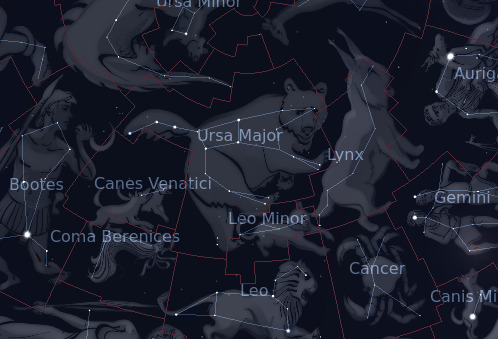
I'll admit this is taken from Poul Anderson, as quoted in Atomic Rockets, to which I owe an inmense debt for this post and so much more. The idea is this; space is big, as is well established. Even with FTL to shorten the distances, even if you could cross the galaxy in a few weeks, the sheer number of stars is still insanely massive. Why should any civilization 'colonize' those stars dot by dot, what value is there in invading or colonizing planets with incompatible biochemistries? And how could even begin to think how to administer a thousand different worlds, each one as complex as Earth itself, let alone an entire galaxy? In this case, civilizations, instead of spreading across the galaxy, would mostly remain in their own 'civilization clusters'; even with FTL, there are so many issues closer to home that the idea of projecting power outside is ridiculous. There would be trade, exchange of ideas, and so much more between these clusters, but never constant enough and never with the authority necessary to create a "Galactic Empire"… the worlds are too many, too diverse, too populated and too far away for that. An interstellar traveller could roam the Galaxy for years exploring these clusters spread away from each other, with their own unique idiosyncracies and civilizations inside, and then a vast expanse of mostly nothing outside them. Basically, space is too big. I like to see them as constellations among the dark sky, hence the artwork.
The No Man's Sky Model

To live in space, you need complex technology, but also resilient and durable technology ready for any kind of situation, easy to repair and replace. So eventually, I believe designs would be standarized so much that every astronaut will carry or own a collection of standarized tools (somehow this reminds me of prehistoric tool cultures). Now, even with FTL, there's perhaps little material incentive for people to leave their comfortable homeworld or habitat to live in cold space. But some will, perhaps because of the sheer thrill of it, perhaps very small bands of families or friends. With a standarized tool kit for any ocassion, these small bands would spread across space, much like ancient humans spread across the world. But instead of creating space empires, without a fixed industrial base, they would be nomads. Which doesn't mean they would roam aimlessly, they would be seeking new biospheres, new resources and new cultures, and gathering in temporary or permanent market places, festivals and pilgrimages. Perhaps they could even be the majority of humans in space, while most others stay cozy on Earth.
...
This was a very long post and it took a lot work to make, so I hope you had as much fun reading it as it was for me to write it. If you did, and if you would like to see more, I would be very, very grateful if you donated to my Ko-Fi below. Anything helps a lot especially since my country is not doing great at this time governed by a libertarian idiot (not even the fun space kind), and even a little tip encourages me to post more, I'm always working on your suggestions! You can also contact me by DM or asks if you need any help with your worldbuilding or just want to rant with me a bit! See you next time, and thanks for reading.
248 notes
·
View notes